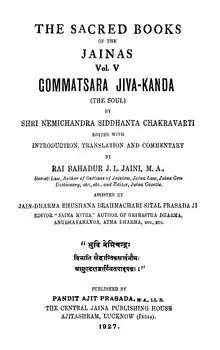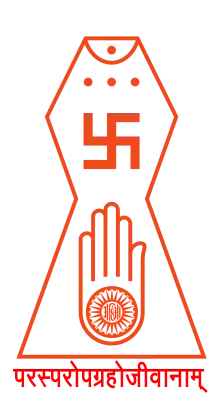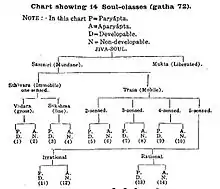Gommatsāra
Gommatsāra is one of the most important Jain texts authored by Acharya Nemichandra Siddhanta Chakravarti.[1][2]
| Gommatsāra | |
|---|---|
 Gommatsara Jiva-Kanda (1st part of the Gommatsara) | |
| Information | |
| Religion | Jainism |
| Author | Acharya Nemichandra Siddhant Chakravarti |
| Period | 10th century CE |
| Part of a series on |
| Jainism |
|---|
 |
|
|
History
Gommatsāra was written by Nemichandra in 10th century CE in Prakrit.[3][4] It is based on the major Jain text, Dhavala written by the Acharya Bhutabali and Acharya Pushpadant.[5] Sermons on Gommatasara was delivered in 1635 by Rupchand Pande, teacher of Hemraj Pande.[6]
Content

Classification of souls (gatha 72)
Gommatasara provides a detailed summary of Digambara doctorine.[3] It is also called Pancha Sangraha, a collection of five topics:[7]
- That which is bound, i.e., the Soul (Bandhaka);
- That which is bound to the soul;
- That which binds;
- The varieties of bondage;
- The cause of bondage.
The first of these, namely, (Bandhaka) i. e., the mundane soul forms the subject-matter of Jiva Kanda (description of the soul). The other four form the subject-matter of Karma Kanda.[7]
See also
References
Citations
- Ghoshal 1989, p. xi.
- Jaini 1927, p. 5.
- Orsini & Schofield 1981, p. 71.
- Orsini & Schofield 1981, p. 73.
- Jaini 1927, p. 3.
- Orsini & Schofield 1981, p. 87.
- Jaini 1927, p. 2.
Sources
- Jaini, Jagmandar-lāl (1927), Gommatsara Jiva-kanda Alt URL
- Ghoshal, Sarat Chandra (1989), Dravya Samgraha of Nemichandra Siddhanta Chakravartti, ISBN 9788120806344
- Orsini, Francesca; Schofield, Katherine Butler, eds. (1981), Tellings and Texts: Music, Literature and Performance in North India, Open Book Publishers, ISBN 978-1-78374-105-2
- Sangave, Vilas Adinath (2001), Facets of Jainology: Selected Research Papers on Jain Society, Religion, and Culture, Mumbai: Popular Prakashan, ISBN 978-81-7154-839-2
This article is issued from Wikipedia. The text is licensed under Creative Commons - Attribution - Sharealike. Additional terms may apply for the media files.
